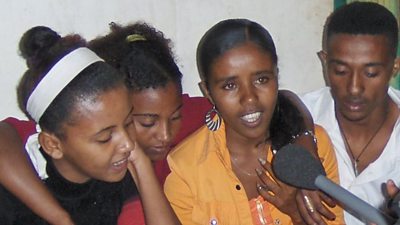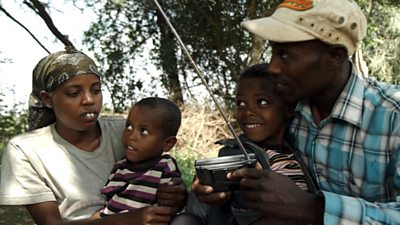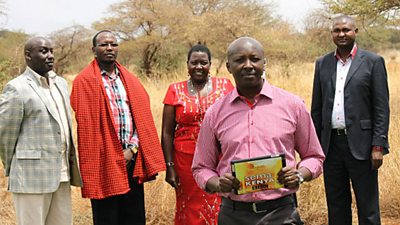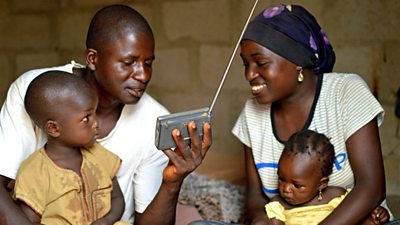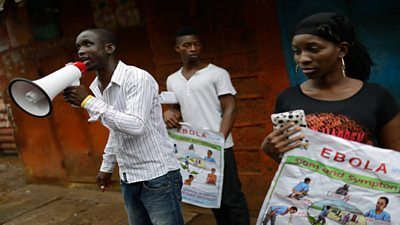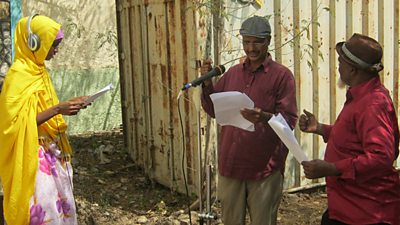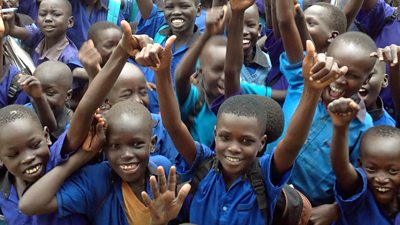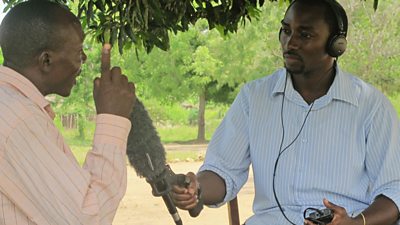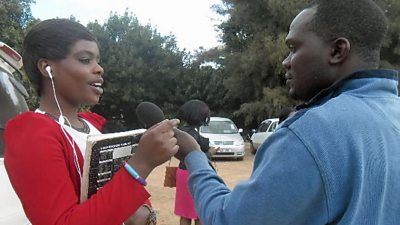Abugida has helped and encouraged me to make some very important decisions. The programme has inspired me to discuss sexual health with my friends and even with my parents
Sexual health is a major issue for young people in Ethiopia, but a lack of access to information and knowledge of the issues as well as some traditional attitudes towards gender and sex make it hard for young people to make informed choices about their personal health.
According to the UNFPA's 2010 Ethiopia Gender Survey, 42% of girls in rural areas experience sexual initiation before their first period, and the culture of early marriage can lead to problems of fistula, stillbirth and low-birth weights from early pregnancy.
From 2006, the magazine-style radio show Abugida, meaning 'A,B,C,D' in Amharic, provided almost 2 million young people with access to a frank and informed discussion. At the same time its sister show Dawwiitii Dargaggootaaor (Mirror Of Youth) in Oromifa, broadcast to a wider audience in the Oromia region.
Lack of information
"There's so many misconceptions about sex in Ethiopia," said Elsabet Samuel, producer of the Abugida show. "I recently met a girl who was beaten by her parents because she started menstruating. They thought it meant that she had started having sex."
Despite decades of health campaigns, Samuel said misinformation is at the root of the problem.
"Conversations just don't happen" she said. "Mothers are too embarrassed to talk to their daughters, girls are shy, even friends don’t talk about it."
Another Abugida producer, Frehiwot Guangul, explained that people need more than just information. "What they really need is communications skills."
"They need to learn how to talk about sex, how to talk to their parents, negotiate with their partners, talk about contraception."
Let's talk about it
The shows included personal testimonies, drama, and music - often employing humour to cover a range of sexual health issues from HIV and AIDS to female circumcision, and use of contraception.
For some, it made a lasting difference.
"Abugida has helped and encouraged me to make some very important decisions. The radio programme has inspired me to discuss sexual and reproductive health with my friends at school and even with my parents" said 17-year-old Sefa Jemal.
"I was overjoyed when my mother declared that she had decided not to have my sisters circumcised after all [after listening to the programme]. She asked me to record Abugida for her every week."
More than radio
Abugida engaged with its audience both on and off-air.
At its peak, 120 listeners clubs were running across Ethiopia in collaboration with local NGOs. In these groups around a dozen young people would gather to listen to Abugida and Dawwiitii Dargaggootaa and discuss the issues with a facilitator.
The programme team also built partnerships with Ethiopian schools to broadcast 15-minute versions of the shows during school break times.
One member of a listening group, 17-year-old Desta, said the show has managed to break the silence and adds that the conversations spread further than the group itself: "Even in our family we are beginning to talk more, to have the courage to talk about condoms and the opposite sex that we didn’t have before."
Thirty public service announcements and mini dramas about a range of sexual and reproductive health issues were also broadcast in Amharic and Oromifa between 2006-2008.
Understanding audiences
����ý Media Action trained local researchers to carry out 2,400 face-to-face interviews and 44 focus groups with 15-24-year-olds across Ethiopia.
Different show formats were tested on people in both rural and urban areas. The findings played a central role in helping the production team to refine ideas, and clarify messages.
The value of this formative research was demonstrated in 2010 when Abugida was named mass media communicator of the year in the 4th annual pan-African awards for strategic HIV and AIDS communication.
Robert Ritzenthaler of Family Health International (FHI) and one of the judging panel said: "This is an exceptionally well-designed and executed programme. The audience is defined and understood, the messages are highly relevant, and components are in place to evaluate impact.
"This is what a winning programme should look like. Other communicators can learn from it" he added.
����ý Media Action worked in partnership with Radio Ethiopia, Ethiopian health workers, community leaders and non-governmental organisations.
Radio Ethiopia, the state broadcaster, was a key partner in the initiative. Every six months four Radio Ethiopia producers worked on the programmes, developing their skills and contributing ideas.
Further afield, ����ý Media Action trained 90 Ethiopian journalists and 60 non-governmental organisation staff to communicate sexual and reproductive health issues to young people.
An advisory panel was established to review the sexual and reproductive health messages contained in programming and to ensure their relevance to the target audience.
Members of the panel included representatives of Ethiopia's Ministry of Youth and Sports, Ministry of Health, Oromiya Health Bureau, HIV/AIDS Prevention and Control Office, Ethiopian Women Lawyers Association, Kembatta Women Development, Family Guidance Association Ethiopia and UNAIDS.
Project information
| Project name | Abugida - (A,B,C, D) and Dawwiitii Dargaggootaa (Mirror Of youth) |
| Funder | , Intrahealth, Reed Global |
| Dates | 2008-2010 |
| Themes | Health |
| Outputs | Abugida (A,B,C, D) and Dawwiitii Dargaggootaa (Mirror of youth) |
| Broadcast partners | Radio Ethiopia, Ethiopia's Ministry of Youth and Sports, Ministry of Health, Oromiya Health Bureau, HIV/AIDS Prevention and Control Office, Ethiopian Women Lawyers Association, Kembatta Women Development, Family Guidance Association Ethiopia and UNAIDS |
Our projects in Ethiopia
-
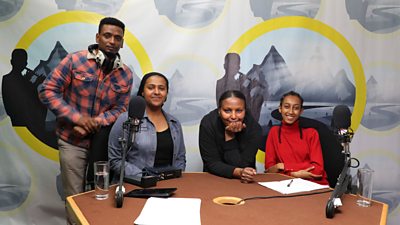
Negat: A new 'dawn' for young people in Ethiopia
Our radio and TV programme, Negat (Dawn), is challenging stereotypes and inspiring young people to seek out new opportunities. -
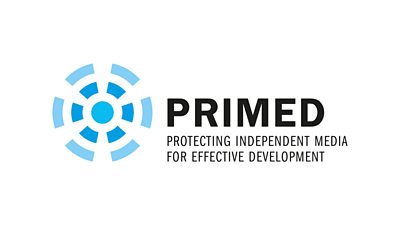
Protecting independent media for effective development
We are working with media support organisations and local partners to find out how best to support public interest media in Sierra Leone, Ethiopia and Bangladesh. -
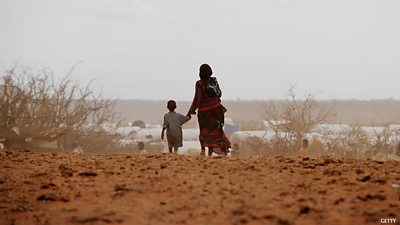
How communication can address unsafe migration through and from Ethiopia
This programme focused on providing information and forums for discussion about unsafe and illegal migration so that people could make informed decisions. -
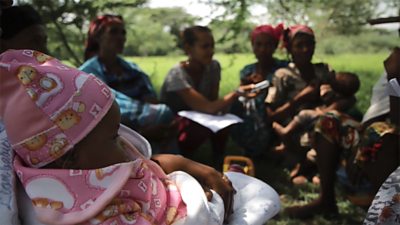
BabyWASH: Reducing childhood diarrhoea through radio
We encouraged healthier hygiene practices by mothers and fathers in Ethiopia to help protect children from often-deadly conditions such as diarrhoea through radio, community discussion and training with health workers. -
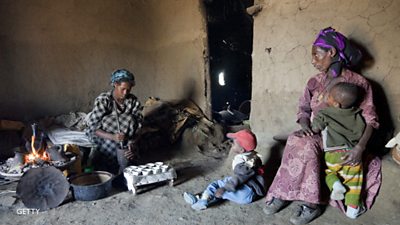
Using radio to address indoor air pollution in Ethiopia
Air We Breathe was a health-focused project in the Oromia region of Ethiopia addressing indoor air pollution through radio and public service announcements. -
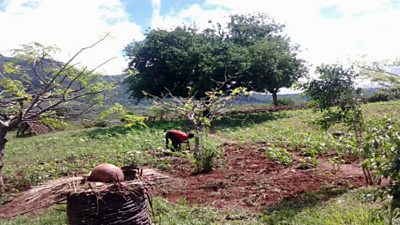
Building resilience to extreme weather through radio
Radio programmes and mobile phone services have helped improve farmers’ access to accurate weather information in Ethiopia.
